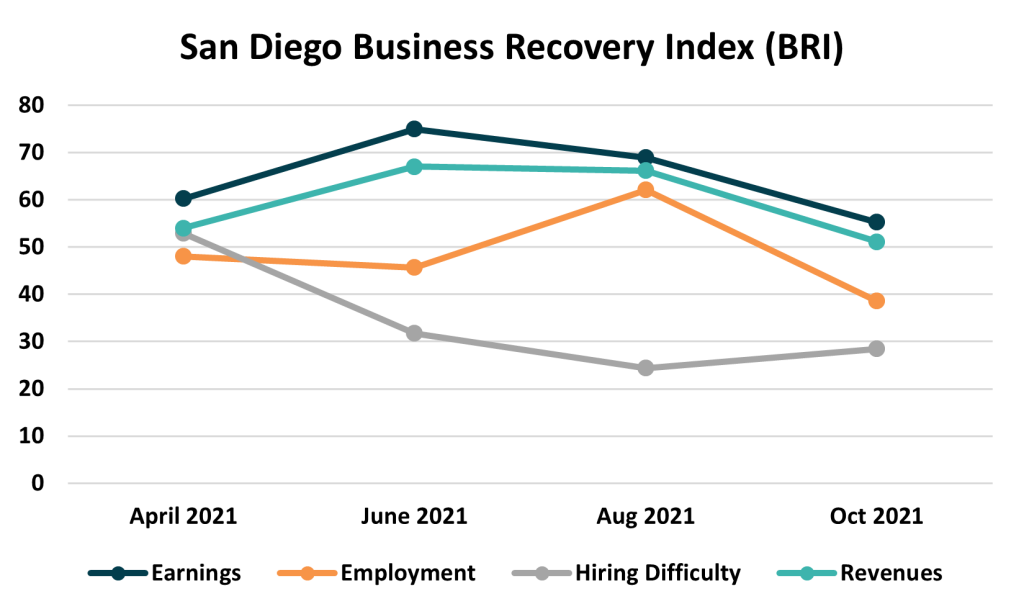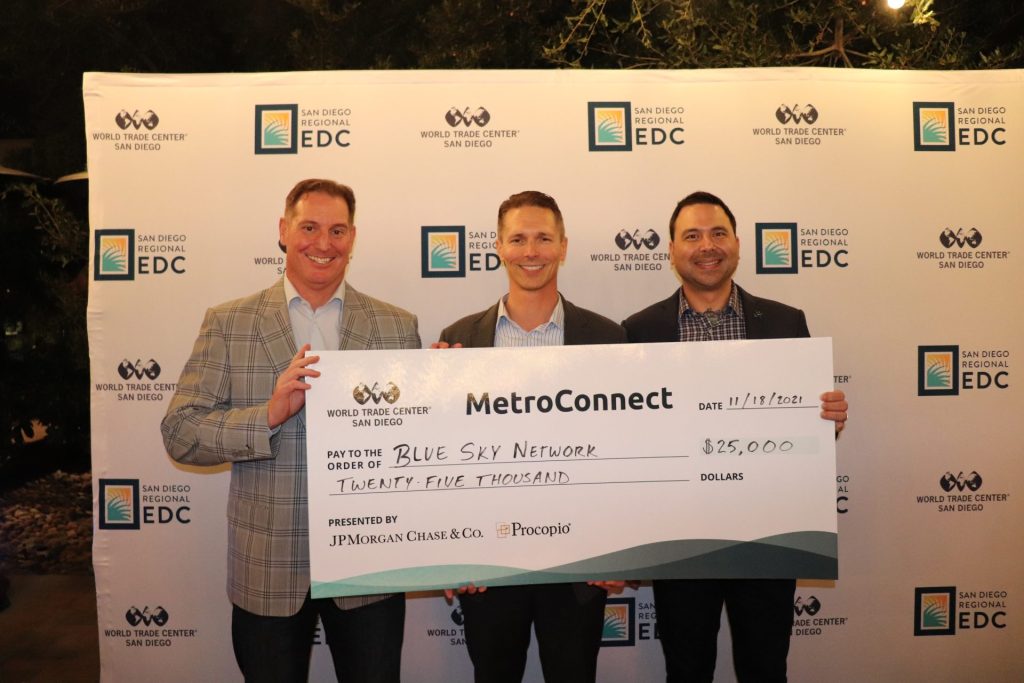15
companies supported
850
jobs supported
$10 M
net export increase, 2021
World Trade Center San Diego (WTCSD), an affiliate of San Diego Regional Economic Development Corporation (EDC), cultivates a pipeline of export-ready firms, maximizes foreign direct investment (FDI) opportunities, and enhances San Diego’s global identity. A globally-connected economy creates quality jobs and makes the San Diego region more prosperous, competitive, and resilient – especially crucial amid COVID-19 and its aftershocks.
As we look toward 2022, here are four key ways WTCSD helped make San Diego a more globally competitive, resilient region:
1. MetroConnect V helps companies go global, awards fifth winner
2021 was an exciting year for WTCSD’s MetroConnect export accelerator program as the fifth cohort of incredible small to mid-sized San Diego companies wrapped up participation in the program.
These companies received $5,000 grants to bolster their export initiatives and international expansion efforts. Amid a pandemic, companies needed more digital support services than ever to help navigate growing e-commerce needs during the pandemic. To support, WTCSD held a Digital Trade Series, which assessed each client’s needs and arranged one-on-one counseling sessions with contracted e-commerce experts.
Over the course of the program, one company stood out – with MetroConnect’s support, satellite-based communications and fleet management company Blue Sky Network generated a 36 percent increase in monthly recurring revenue in Brazil, as well as its largest order to date. To support this growth, the company hired seven new full-time employees. Ultimately, WTCSD crowned Blue Sky Network MetroConnect V’s winner and awarded it a $25,000 grant toward its international expansion goals.
Over the past five years of MetroConnect, 80 companies collectively leveraged $890,000 in export grants, resulting in a $95 million net increase in exports from the San Diego region.

2. WTCSD debuts a regional trade and investment strategy for 2025
In 2015, San Diego Regional EDC’s release of “Go Global: San Diego’s Trade and Investment Initiative,” launched the World Trade Center in San Diego, bringing regional companies and stakeholders together with a global vision. Throughout 2020 and early 2021, WTC engaged many of the same partners, and new ones, in an effort to gauge how the region measured up to it, more than five years later. This 2021 update analyzed the state of exports, foreign investment and VC, as well as the extraordinary impact of COVID. Through rigorous data analysis dozens of interviews with public and private-sector leaders, WTC synthesized a set of five key priorities the region should focus on over the next five years. Find out what they are here. Key findings include:
- 2020 saw $3 billion in foreign investment into San Diego
- 73 percent of investment into San Diego is in Life Sciences
- San Diego exports $22 billion in goods each year
- San Diego is a top 10 services exporter among U.S. metros
Heading into 2022, we expect to see FDI investment portfolios return to the same levels seen in 2019.
3. Export Small Business Development Center (SBDC) supports export and COVID-relief projects
Beyond MetroConnect, the Small Business Development Center (SBDC) at WTCSD provided 35 export-ready small companies with the support needed to navigate international goals, including exports, manufacturing support, and more.
In addition to expansion support, the Export Specialty Center continued to offer COVID-19 recovery resources at no cost, helping San Diego companies like Funki Adventures apply to Economic Injury Disaster Loan (EIDL), Paycheck Protection Program (PPP) 2nd Draw, Shuttered Venue Operators Grant, and City and County small business grants.
Finally, the Global Readiness Program saw a partnership between WTCSD and the University of San Diego help local small to mid-sized businesses secure STEP grants to grow the regional export pipeline.
4. WTCSD serves as a key source of market intelligence
WTCSD conducted a series of business surveys to better inform decision making of regional partners and affiliates. These included:
Corporate Travel Survey:
- Survey of 12 large businesses and two non-profits in the region to better understand travel and budgets forecasts for the year ahead. This information was critical for the retention of existing service out of SAN and for the attraction of future direct flights. It found:
- 79 percent of respondents are willing to pay a premium to fly on a San Diego nonstop route versus flying out from Tijuana or Los Angeles
- 56 percent of respondents expressed a desire for nonstop service to Mexico City and Sao Paulo
EDC Changing Business Landscape Survey:
- Survey of more than 100 business in the San Diego region, aimed at informing long-term development priorities, across business areas. It found:
- 14 percent of respondents currently import and/or export out of the Port of San Diego
- 24 percent of those surveyed would be interested in using the Port of San Diego if they provided service to the types of goods they ship
Interested in growing your business internationally?
World Trade Center San Diego works directly with companies – free of charge – to help them expand internationally and grow in San Diego. Whether your small company is interested in learning about exporting and international growth, or your small or medium-sized company is ready to export and grow internationally, World Trade Center San Diego is here to help.
Ready to export? Apply to MetroConnect VI by December 17.
Want to know more about WTCSD? Click here to receive our monthly Global Brief Newsletter, delivered straight to your inbox.



 “Blue Sky Network is the perfect reflection of San Diego’s innovation economy coming together, leveraging our excellence in defense and technology now on an international stage,” said Lucas Coleman, senior manager at WTCSD. “The results from MetroConnect’s fifth cohort are impressive. Whether it’s alleviating supply chain processes in Australia or cultivating leads in Korea, Brazil and the UK amid incredible economic uncertainty, working to connect small and medium-sized businesses to international markets builds greater resilience here at home.”
“Blue Sky Network is the perfect reflection of San Diego’s innovation economy coming together, leveraging our excellence in defense and technology now on an international stage,” said Lucas Coleman, senior manager at WTCSD. “The results from MetroConnect’s fifth cohort are impressive. Whether it’s alleviating supply chain processes in Australia or cultivating leads in Korea, Brazil and the UK amid incredible economic uncertainty, working to connect small and medium-sized businesses to international markets builds greater resilience here at home.”